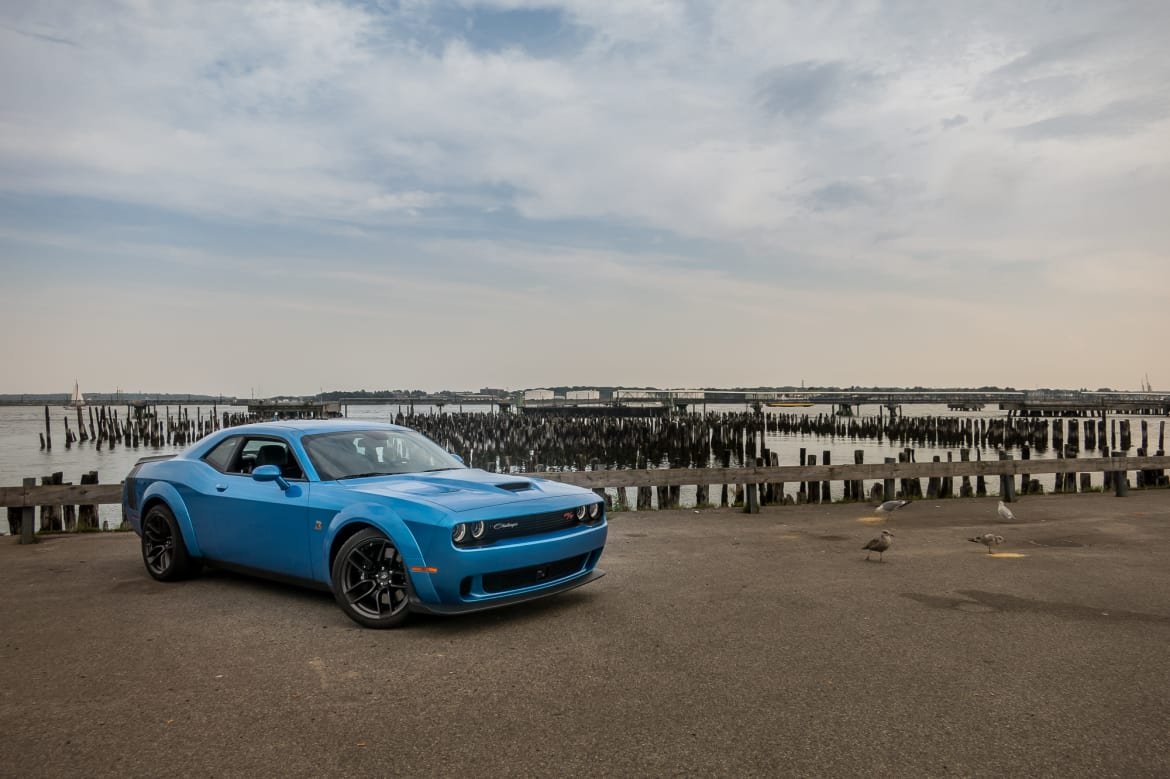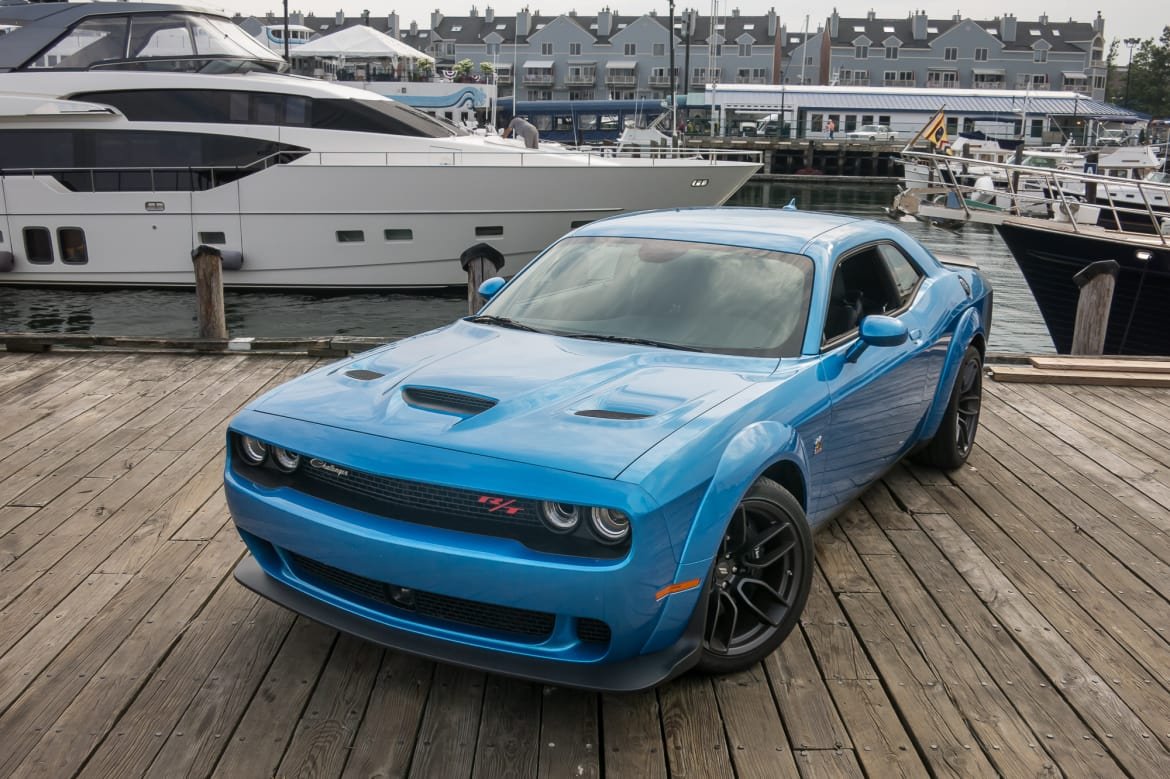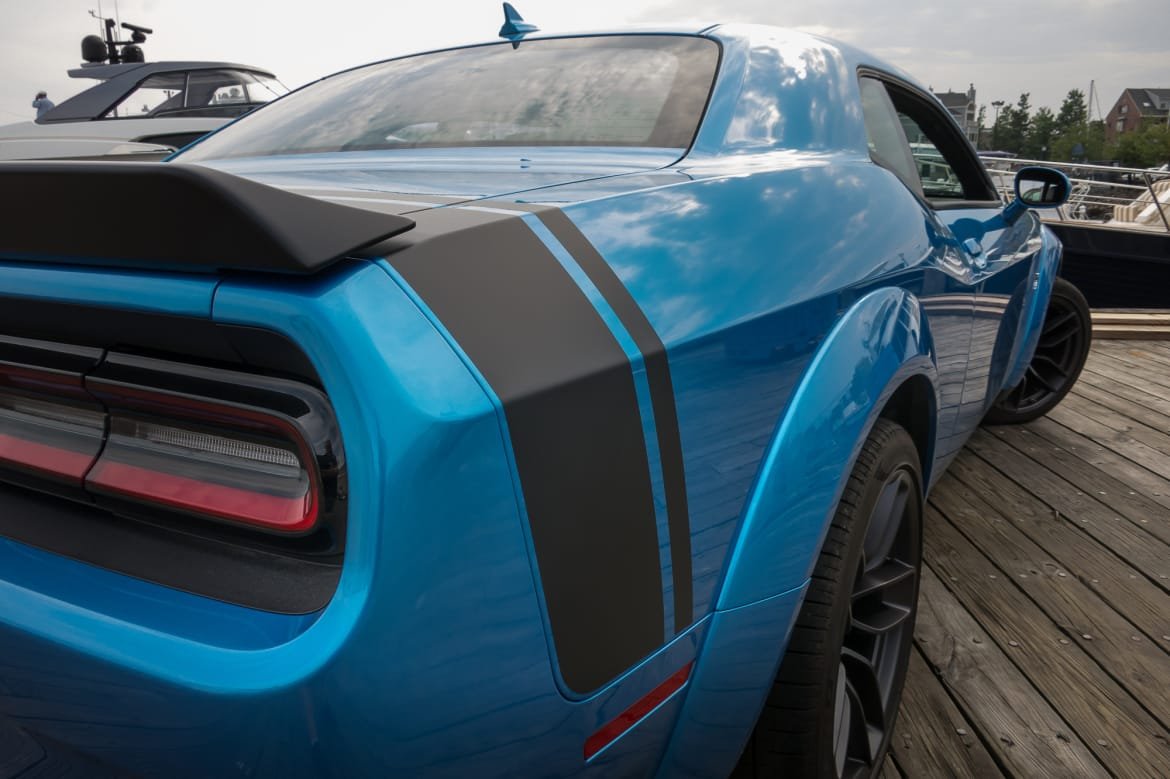[bsa_pro_ad_space id=14]

Cars.com photo by Aaron Bragman
I had just parked the brilliant B5 Blue 2019 Dodge Challenger R/T Scat Pack Widebody in front of Maine’s boat-laden Casco Bay when I heard, “Do a burnout!” yelled from the first bro across the parking lot. “I know that thing can do a burnout!” his bro friend insisted. “Isn’t it a Hellcat?”
Related: More Power Never Hurts: 2019 Dodge Challenger Hellcat Redeye First Drive

Cars.com photo by Aaron Bragman
Nah, bro, it’s not a Hellcat — but you can’t really tell that from 100 feet away, can you? This is the significantly less expensive and much less powerful Challenger R/T Scat Pack Widebody model, which features the same styling as the wild child Hellcat Widebody but lacks that car’s 717-horsepower, supercharged Hemi V-8 (compared to the 707-horsepower Dodge Charger SRT Hellcat). Not that what you get with the R/T Scat Pack is anything to scoff at, its 6.4-liter V-8 making 485 hp and 475 pounds-feet of torque. It doesn’t have the Challenger SRT Hellcat’s banshee-wail supercharger music, but it does still come with a basso profundo exhaust soundtrack that announces your arrival better than any stereo system can.
Driving around town, blasting onto highway on-ramps and running from stoplight to stoplight, the SRT-tuned 6.4-liter Hemi engine’s massive power and torque will provide you all the motivating force you need to embarrass 90 percent of anything that rolls up next to you. Combine it with the optional TorqueFlite eight-speed automatic transmission’s ability to cleanly and quickly put that power to the rear wheels with little drama, and you’re now a legit force to be reckoned with.

Cars.com photo by Aaron Bragman
Tick the box for the Widebody option and things get even better. That brings you an extra 3.5-inches of overall width, some formidable fender flares, and 305/35ZR20 Pirelli tires on 11-inch-wide wheels to boost traction both in a straight line and when taking corners. Stopping power gets amped up thanks to six-piston Brembo brakes up front, and Dodge adds a more aggressive suspension tune, as well. You also get some features in common with the more expensive SRT Hellcat, such as standard line lock for burnouts at the drag strip, launch assist and launch control to help fling the car down that strip, and a new hood that was previously seen on the old Hellcat model before the 2019 Hellcat adopted the new dual-snorkel hood of the Hellcat Redeye.
What this all amounts to is an experience that isn’t all that different from the Hellcat out on the street — except for the lack of noise it generates. You get all the burbling roar when you plant your right foot on the accelerator, but there’s none of the mechanical shriek from the absent supercharger. Yet the blast of acceleration and the jumpy, sensitive throttle response seen on the Hellcat is just as forceful on the Scat Pack, and I wager you’d be hard-pressed to notice a difference in overall thrust between the two cars. They both rocket forward at the slightest prompting, making short work of any stretch of pavement down which you might be pointing the car.
But with the lack of a supercharger comes Dodge’s cylinder deactivation, present on the 5.7-liter and 6.4-liter Hemi engines but not the supercharged 6.2-liter versions. If you have the transmission in Street mode, you’ll experience it when you’re coasting, cruising or lifting from the throttle as a sudden change in the tone of the engine as it goes from from eight to four pistons, and not really a pleasant one. Put your foot back on the accelerator and there’s a split-second pause as the cylinders fire back up again, accompanied by a slight jerk in the drivetrain. Pop the mode selector for the transmission into Sport and this is deactivated. I found myself keeping it in Sport mode just to prevent the cylinder deactivation from cutting off half the engine, as the coarseness of the system just isn’t pleasant.
Lighter Than The Hellcat, and More Likeable
On the track, the R/T Scat Pack feels considerably different from the Hellcat. You may be getting a car that’s less powerful than a Hellcat, but you also get a car that’s better balanced than a Hellcat thanks to different weight distribution — there’s no heavy supercharger or modified intake system up front, making the car about 200 pounds lighter, causing weight distribution split of 55/45 versus 57/43 for the Hellcat.

Cars.com photo by Aaron Bragman
This makes it feel lighter on turn-in and more forgiving if you miss the line through a corner and overshoot an apex. You can get on the throttle sooner, too, and not worry about swapping ends as the Hellcat’s ridiculous torque overpowers the rear tires and sends you spinning. The Scat Pack is easier to use and less intimidating around a track, but I wouldn’t call it more fun. Sometimes hanging the tail out while you roast the tires is what you want to do in a corner, a task more easily accomplished in the Hellcat. But for more control and precision, the Scat Pack is the better choice.
This is not to say that the Challenger R/T Scat Pack is a good road-course car — it’s still much too heavy by several hundred pounds to really be as enjoyable as a Chevrolet Camaro or Ford Mustang on a circuit track. Like its more powerful siblings, the Scat Pack is a car made for the street or the strip, not the road course. Its advantages on interior space, ride quality, cargo room and visibility make it a far more comfortable, practical, reasonable daily-use choice than a Camaro or Mustang. It has the same excellent interior electronics options as the more expensive models, the same ability to spec up a fancy leather interior, and the same outrageous exterior paint color options and graphics packages. All you’re missing is the heftier price tag for the fancier engine.
The Big Advantage: the Bottom Line
It’s kind of amazing that the pricing spectrum on a Dodge Challenger ranges over a $44,000 spread, from the least expensive SXT model to the costliest Redeye. The Scat Pack is an option to add to the R/T-level trim, and it’ll set you back a minimum of $41,390 including destination fee and a gas-guzzler tax of $1,000 on manual-transmission equipped models. The optional automatic transmission avoids the gas-guzzler tax, but its extra cost negates any advantage there. This is a bare minimum price for a Scat Pack, however; the Widebody package adds another $6,000, and leather interior, technology packages and other goodies will continue to bump the price well into the high $50,000 range.

Cars.com photo by Aaron Bragman
Still, this comes in nearly $20,000 less than a fully loaded Hellcat for a car that provides nine-tenths of the fun and craziness. The R/T Scat Pack Widebody is nearly as much fun as the Hellcat, and with all the money you save, you’ll be able to afford tons of extra tires to replace the ones you smoke.
Cars.com’s Editorial department is your source for automotive news and reviews. In line with Cars.com’s long-standing ethics policy, editors and reviewers don’t accept gifts or free trips from automakers. The Editorial department is independent of Cars.com’s advertising, sales and sponsored content departments.
[bsa_pro_ad_space id=15]

